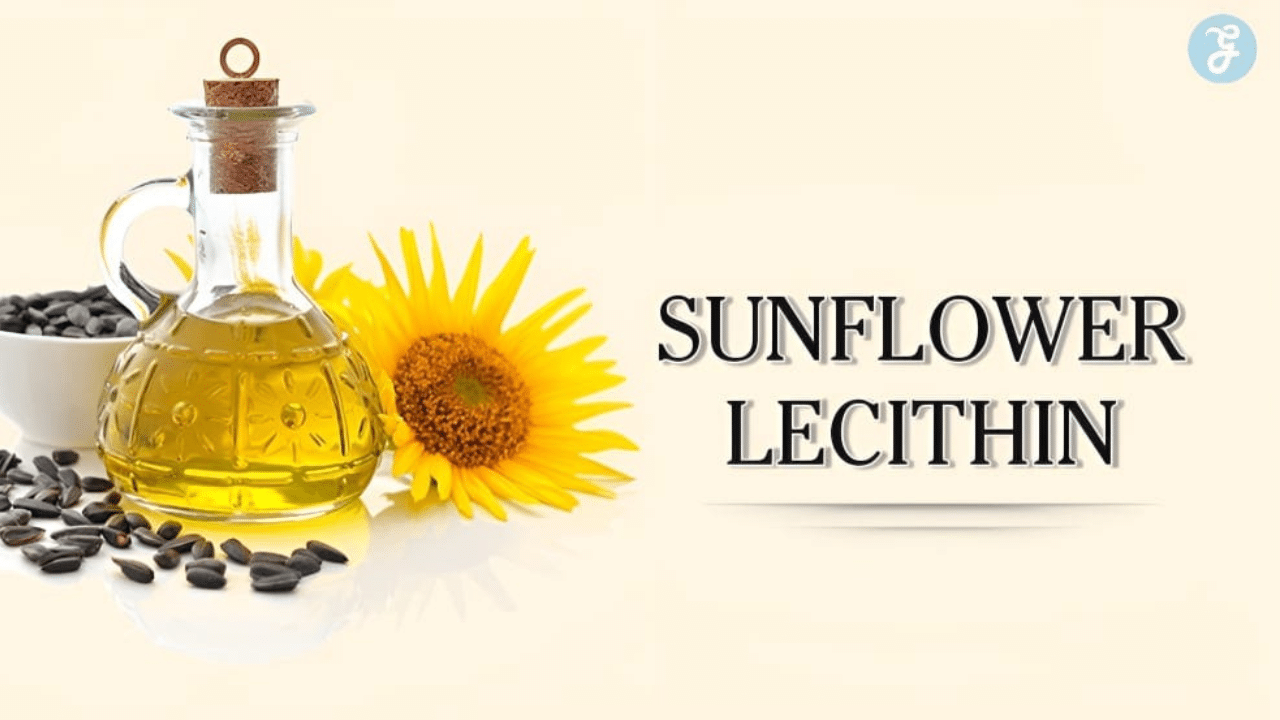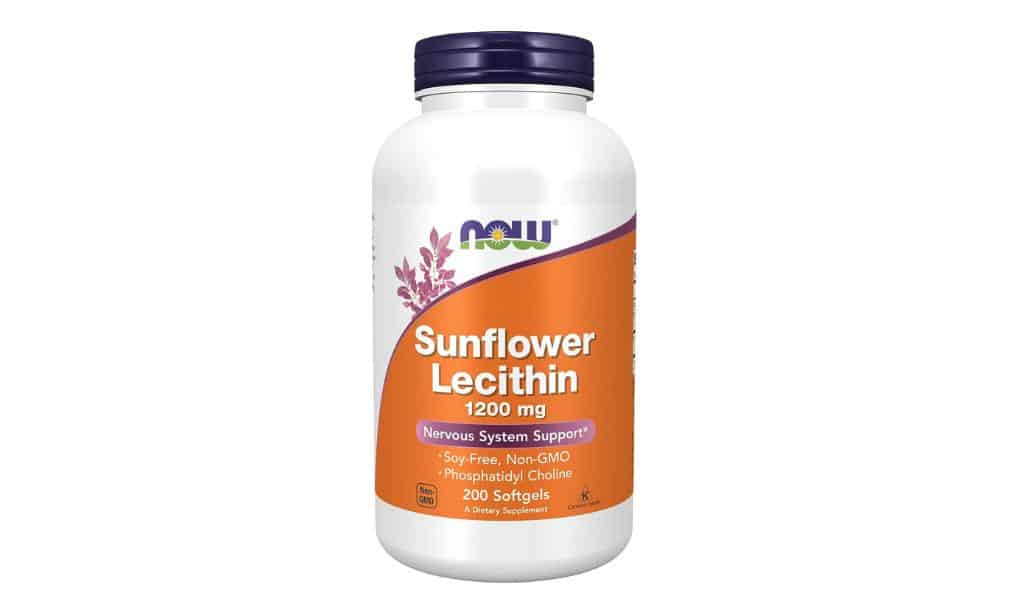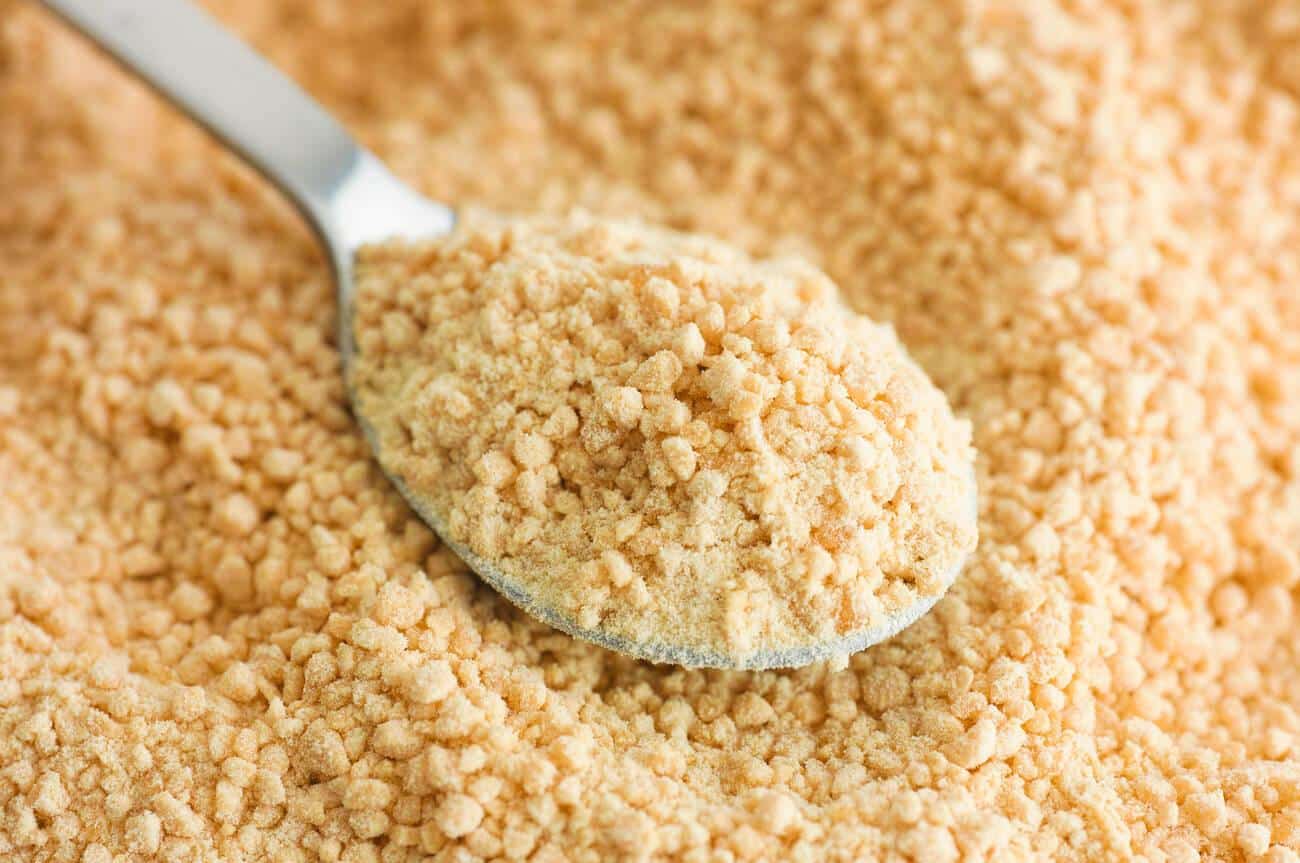Are you seeking a natural solution that’s packed with health benefits? Sunflower lecithin might be the superfood you need. This fatty substance, found in sunflowers, has astonishing advantages, from boosting brain function to maintaining a healthy liver.
Ready to transform your health journey? Let’s dive into everything about sunflower lecithin!
What is Sunflower Lecithin?
Sunflower lecithin is a natural compound derived from sunflower seeds that is commonly used as an emulsifier or stabilizer in various food and cosmetic products.
Comparison with Soy Lecithin
Sunflower lecithin and soy lecithin are both natural substances used in food and health products, but there are some key differences between the two. The table below provides a comparison of the two types of lecithin.
| Sunflower Lecithin | Soy Lecithin | |
|---|---|---|
| Source | Derived from sunflower seeds. | Derived from soybeans. |
| Allergic Reactions | Rarely causes allergies. | It can cause allergies. |
| Estrogenic Properties | Does not have estrogenic properties. | Has estrogenic properties. |
| Extraction Process | Typically extracted without chemicals. | Often extracted using chemical solvents. |
| Omega-6 Fatty Acids | Has a lower level of omega-6 fatty acids. | Has a higher level of omega-6 fatty acids, specifically linoleic acid. |
| Use in Remedies | Often used as a remedy for plugged ducts in breastfeeding. | Less commonly used for this purpose. |
Table: Sunflower Lecithin vs Soy Lecithin
While both sunflower lecithin and soy lecithin have their own benefits and risks, the former is generally considered to be safer and healthier. However, it’s important to consult with a healthcare professional before incorporating either substance into your diet or health regimen.
Health Benefits of Sunflower Lecithin
Sunflower lecithin offers a multitude of health benefits, including lowering cholesterol, boosting brain function, improving ulcerative colitis, supporting skin health, aiding breastfeeding, strengthening the nervous system, lowering stress levels, promoting strong bones, improving sleep quality, and maintaining a healthy liver.
Discover how sunflower lecithin can benefit your overall health and well-being.
Lowering cholesterol
Sunflower lecithin helps your heart. It can lower bad fat in your blood, called LDL cholesterol. A special thing in it called phosphatidylcholine stops your body from taking in too much LDL cholesterol.
This ensures you have less of the bad fat and more of the good one, HDL cholesterol. So, use sunflower lecithin to keep a healthy balance of fats in your blood!
Read More: HMB Supplement: The Future of Muscle Preservation and Recovery
Boosting brain function
Eating sunflower lecithin can make your brain work better. It helps your body take in choline and vitamins that are good for your brain. You will feel less tired and have more energy.
This makes you think faster and focus better on what you’re doing. If the food you eat is hard to digest, sunflower lecithin makes it easier on your stomach. A happy stomach means a happy brain! This way, sunflower lecithin keeps both your gut and mind healthy.
Improving ulcerative colitis
Sunflower lecithin has been found to help improve digestive health in people with ulcerative colitis. It has shown promising results in improving symptoms and aiding digestion in individuals with this condition.
Researchers have studied the potential benefits of lecithin for ulcerative colitis and have found positive outcomes. Sunflower lecithin can be a helpful addition to the treatment plan for those experiencing digestive issues or inflammatory bowel diseases like ulcerative colitis.
Supporting skin health
Sunflower lecithin is beneficial for supporting skin health. It helps to restore hydration in the skin, keeping it moisturized and preventing dryness. Additionally, sunflower lecithin promotes collagen production, which can help improve the elasticity and firmness of the skin.
This makes it a useful ingredient for individuals with irritated skin conditions or those looking to maintain healthy and youthful-looking skin. Sunflower lecithin can be applied topically as a moisturizer or incorporated into skincare products for its nourishing properties.
It is considered safe and has no significant reported side effects when used for maintaining healthy skin.
Aiding breastfeeding
Sunflower lecithin can be a helpful supplement for breastfeeding moms. It has been found to prevent clogged milk ducts, which can be painful and reduce milk supply. Taking sunflower lecithin can help improve the flow of milk and prevent blockages.
It is considered safe for babies when taken by breastfeeding mothers and does not decrease milk supply. Sunflower lecithin also increases choline concentrations in breast milk, which is important for brain development in infants.
The recommended dosage may vary, so it’s best to consult with a healthcare professional before adding sunflower lecithin to your breastfeeding routine.
Strengthening the nervous system
Sunflower lecithin is beneficial for strengthening the nervous system. It contains inositol, which helps maintain healthy cell membranes in the brain and throughout the body. This supports overall brain health and can improve cognitive function.
By keeping our cell membranes strong, sunflower lecithin promotes efficient communication between nerve cells, which is essential for a healthy nervous system. So including sunflower lecithin in your diet can benefit your brain and your entire nervous system.
Lowering stress levels
Sunflower lecithin can help lower stress levels due to its ability to increase serotonin levels and decrease cortisol levels in the body. These effects are attributed to the presence of phosphatidylserine, a compound found in sunflower lecithin.
By promoting relaxation and restful sleep, sunflower lecithin can effectively reduce stress and anxiety. Additionally, some individuals have reported improved conditions like eczema and acne when using sunflower lecithin, which can contribute to reduced stress levels.
The hormone-balancing properties of sunflower lecithin may also indirectly help lower stress levels. Overall, incorporating sunflower lecithin into your daily routine may be beneficial for managing stress and achieving a sense of calmness.
Read Also: 15 Best Ashwagandha Supplements: Nature’s Gift to Wellness!
Promoting strong bones
Sunflower lecithin is beneficial for promoting strong bones. It supports the growth and maintenance of healthy bone density. This can help prevent conditions like osteoporosis and fractures.
Sunflower lecithin contributes to overall bone health, ensuring that our bones stay strong and sturdy as we age. Incorporating sunflower lecithin into your diet can naturally support your skeletal system and keep your bones in great shape.
Improving sleep quality
Sunflower lecithin can help improve sleep quality. This is because it contains phosphatidylserine, which has been shown to contribute to better sleep. Sunflower lecithin can indirectly support a good night’s sleep by reducing stress levels and promoting relaxation.
It also has potential benefits for brain health, which can affect sleep quality. By supporting the functioning and maintenance of brain cells, sunflower lecithin may positively improve sleep quality.
Maintaining a healthy liver
Your liver plays a crucial role in keeping your body healthy. Sunflower lecithin can help maintain a healthy liver by preventing the buildup of fats in this vital organ. Your liver is responsible for over 500 functions in your body, including detoxifying harmful substances, producing bile to aid digestion, and storing important vitamins and minerals.
Incorporating sunflower lecithin into your diet can support your liver’s function and overall well-being.
Possible Side Effects of Sunflower Lecithin
Some possible side effects of sunflower lecithin include concerns during pregnancy, gastrointestinal reactions, and skin reactions.
Pregnancy concerns
During pregnancy, it is generally safe to consume sunflower lecithin. However, it is important to consult with a healthcare professional before adding it to your diet. Taking more than the recommended dose of sunflower lecithin during pregnancy can lead to gastrointestinal issues like diarrhea, cramping, or bloating.
Overdosing on sunflower lecithin while pregnant may cause nausea, stomach aches, abdominal bloating, vomiting, and decreased appetite. It’s always best to talk to your doctor before taking any new supplements during pregnancy.
Gastrointestinal reactions
Taking sunflower lecithin supplements may cause gastrointestinal reactions in some people. These reactions can include symptoms such as diarrhea, cramping, and bloating. It is important to note that these side effects are more likely to occur if you take a higher dosage of sunflower lecithin than what is recommended.
Taking too much can lead to discomfort like bloating, gas, and even more frequent episodes of diarrhea. Some individuals may also experience nausea or stomach pain after consuming sunflower lecithin.
Therefore, following the recommended dosage guidelines for this supplement is essential to minimize the risk of experiencing any gastrointestinal issues.
Skin reactions
Sunflower lecithin can sometimes cause skin reactions in certain individuals. These reactions may include symptoms such as itching, irritation, and swelling around the affected area.
It is important to note that these reactions are typically rare but can occur in people with an allergy or sensitivity to sunflower lecithin. For those who experience these skin reactions, it is recommended to discontinue use and consult a healthcare professional for further guidance.
Despite the possibility of skin reactions, sunflower lecithin also has potential benefits for the skin. It can help restore hydration and promote collagen production, making it useful for treating irritated skin conditions like eczema and acne.
Recommended Dosage of Sunflower Lecithin
Most manufacturers suggest taking about 1-1.5 tablespoons of sunflower lecithin powder, granules, or liquid. However, there is no official recommended dosage for sunflower lecithin.
Adults commonly use it in doses of 20-30 grams per day. It is generally advised not to exceed a dosage of 5,000 mg (or 5 grams) daily. Sunflower lecithin is considered safe and can be taken regularly to improve energy levels, enhance immune functioning, and reduce fatigue.
How to Incorporate Sunflower Lecithin into Your Diet
Incorporating sunflower lecithin into your diet is easy and convenient. You can find it in supplement form, which you can take as directed by the packaging or consult with a healthcare professional for personalized dosage recommendations.
Additionally, you can incorporate sunflower lecithin into your meals by adding it to smoothies, soups, salad dressings, or baked goods as an emulsifying agent or natural thickener.
Supplement form
Sunflower lecithin is available in supplement form, which makes it easy to incorporate into your daily routine. Depending on your preference, you can find it in capsule or powder form.
Taking sunflower lecithin as a supplement ensures that you are getting a concentrated dose of its health benefits. Plus, it’s convenient and hassle-free. So whether you want to support brain function, improve digestive health, or lower cholesterol levels, taking sunflower lecithin in supplement form may be the way to go.
Food sources
Sunflower lecithin can be easily incorporated into your diet through various food sources. You can find it in sunflower seeds, which you can eat as a snack or use in baking and cooking recipes.
Other sources include sunflower seed butter or oil, which can be used as an ingredient in spreads, dressings, and sauces. Some health food stores also carry products that specifically contain sunflower lecithin, such as granola bars and protein powders.
By adding these foods to your meals or snacks, you can enjoy the benefits of sunflower lecithin while also enjoying delicious flavors.
Read More: Tinnitus 911 Review – Does This Supplement Work to Stop Buzzing Effectively?
Sunflower Lecithin vs. Soy Lecithin
Sunflower lecithin and soy lecithin have unique benefits, but they have some key differences.
Differences and benefits
Sunflower lecithin and soy lecithin have some important differences and benefits. One major difference is that sunflower lecithin is derived from sunflowers, while soy lecithin comes from soybeans.
This makes sunflower lecithin a great alternative for people with allergies or sensitivities to soy.
Regarding health benefits, sunflower lecithin has been found to be superior to soy lecithin. Sunflower lecithin contains essential vitamins, minerals, choline, and healthy fats that can help improve various aspects of our health.
Meanwhile, soy lecithin has been associated with increased stress and anxiety levels.
Additionally, sunflower lecithin may aid in reducing blood pressure and boosting immunity. It also supports brain function, helps maintain good cholesterol levels, improves skin health, aids breastfeeding mothers, strengthens the nervous system and bones, and promotes better sleep quality.
Storage and Shelf Life of Sunflower Lecithin
Sunflower lecithin is a shelf-stable product and remains safe to consume even during long storage periods. If you have liquid sunflower lecithin, it does not need to be refrigerated and can last for up to two years if stored unopened in a cool, dry place.
This is because lecithin, including sunflower lecithin, has a high fat content which helps extend its shelf life. However, the powder form of sunflower lecithin has a shorter lifespan of about 45 days.
If you want to make your sunflower lecithin last longer, you can refrigerate or freeze it to keep it fresh for an extended period of time.
Frequently Asked Questions (FAQs)
If you want to know more about sunflower lecithin, check the answers below.
1. What is sunflower lecithin, and why is it used?
Sunflower lecithin is a natural substance derived from sunflower seeds that is often used as an emulsifier or thickening agent in food products.
2. Is sunflower lecithin safe to consume?
Yes, sunflower lecithin is generally considered safe for consumption. It contains no known side effects and does not contain soy or other common allergens.
3. Can sunflower lecithin be used in cooking and baking?
Yes, sunflower lecithin can be used in cooking and baking as an alternative to other emulsifiers like soy lecithin. It helps ingredients blend together smoothly and enhances texture.
4. Does sunflower lecithin offer any health benefits?
While more research is needed, some studies suggest that sunflower lecithin may support brain function, liver health, and heart health due to its phospholipids content. However, further scientific evidence is required to confirm these potential benefits.
Disclaimer: This content is for informational purposes only and does not replace professional medical advice, diagnosis, or treatment. This information is not comprehensive and should not be used to make health or well-being decisions. Consult a qualified healthcare professional with questions about a medical condition, treatment options, or health regimen. This website or the content should never replace professional medical advice.













































